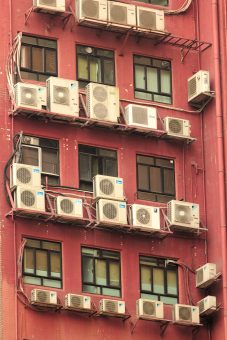
Natural refrigerants protect the environment and the climate. In Latin America and the Caribbean, they are replacing existing products that harm the climate.
With ever longer cold chains, the global movement of goods is driving up demand for air conditioning and refrigeration systems – particularly in countries in the Southern Hemisphere. Such systems generate additional greenhouse gas emissions worldwide and thus contribute to the climate crisis.
Many sectors depend on reliable, effective cooling systems for the production, storage and transport of goods. An example is the flower industry in Colombia – the world’s second largest exporter of cut flowers after the Netherlands. Tulips, lilies and sunflowers have a short life span and need to be refrigerated to stay fresh. The problem is that most cooling systems still use fluorinated greenhouse gases (F-gases) as refrigerants, which harm the environment and the climate.
However, this situation can be prevented by using natural alternatives such as hydrocarbons, carbon dioxide and ammonia, which are environmentally friendly and also more cost-effective in the long term as they are more energy efficient. The Deutsche Gesellschaft für Internationale Zusammenarbeit (GIZ) GmbH is promoting the use of these alternatives in seven Latin American and Caribbean countries. On behalf of the German Federal Ministry for Economic Cooperation and Development (BMZ), and cofinanced by the European Union (EU), GIZ is working to minimise greenhouse gas emissions in refrigeration technology.
More:
Together with the United Nations Development Programme (UNDP) and the United Nations Industrial Development Organization (UNIDO), GIZ supports local concepts tailored to specific national conditions and challenges. In liaison with local companies and refrigeration equipment users, solutions are being developed to facilitate the transition to modern refrigeration technologies.
Know-how for a ‘cool’ future
Concepts include measures that directly reduce emissions; for example, ensuring that old refrigerators and air conditioning systems are disposed of correctly. At the same time, the project is developing a comprehensive knowledge management system. It has created 47 manuals and guides that support local initiatives with the practical transition to natural refrigerants.
In addition, the project and its partners are making sustainable cooling technologies more readily available. In Costa Rica, for example, hotels and public buildings have installed 100 eco-friendly air conditioning systems. The initiative also offers training courses for refrigeration technicians, which teach them how to operate and maintain modern refrigeration equipment and handle natural refrigerants safely. In total, 65 training sessions were held across the entire region, and more than 1,600 participants learned how to refrigerate efficiently while protecting the climate.
Source: GIZ



